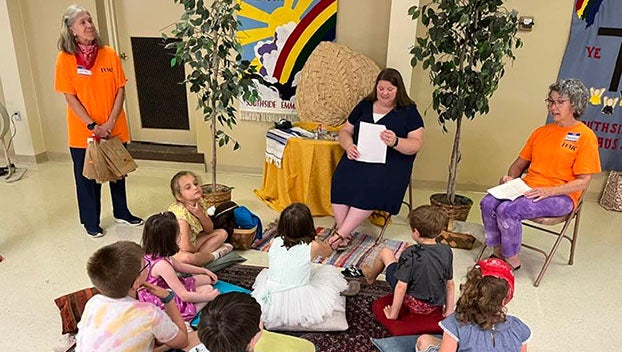Thirty-fifth anniversary for PCS
Published 1:04 pm Thursday, May 3, 2018

- Members of the Piedmont Community Criminal Justice Board. Pictured are, from left, Prince Edward County Administrator Wade Bartlett; defense attorney Calvin Spencer; Charlotte County Commonwealth Attorney William Green; Lunenburg Supervisor Alvester Edmonds; Chief Magistrate Chris Salerno; Piedmont Court Services Director Renee T. Maxey; State Senator Mark Peake (guest speaker); Powhatan County Commonwealth Attorney Richard Cox; Prince Edward County Commonwealth Attorney Megan Clark; Appomattox County Administrator Susan Adams; Judge Marvin Dunkum; Appomattox County. Commonwealth Attorney Darrel Puckett; Cumberland County Sheriff Darrell Hodges; citizen member, Haywood Hamlet; Powhatan County Chief Deputy Sheriff Adam Sadler; Amelia County Education Representative Maria Whitaker; Cumberland County Supervisor Parker Wheeler and Piedmont Regional Jail Administrator Jim Davis.
Piedmont Court Services (PCS) provides probation services to the nine area counties of Amelia, Appomattox, Buckingham, Charlotte, Cumberland, Lunenburg, Nottoway, Powhatan and Prince Edward.
The Piedmont Community Criminal Justice Board (PCCJB) members generously donate their time and efforts to guide and assist PCS in meeting its goals and initiatives in its continual search for ways to enhance and improve probation services. Other members of the PCCJB include Judges Les Osborn and Robert G. Woodson, Crossroads Director Susan Baker, Sheriffs Brad Nunnally and Larry Parrish, Court Clerk Dana Franklin and Charles Martin.
PCS is celebrating 35 years of providing probation supervision of adult, non-violent offenders. The legislative authority enables PCS to maintain programs and services for the judicial system with sentencing alternatives for adult misdemeanants and felons. PCS is comprised of a staff of seven probation officers, an office manager and the director. The agency’s purpose is to help protect the community, ensure public safety and assist in reducing the recidivism rate of offenders. From October 1983 – June 30, 2017, 14 percent of the 24,014 offenders supervised by PCS were placed under supervision on more than one occasion by the courts in the agency’s service area. On average, three-fourths of all offenders supervised by PCS have successfully completed their court-ordered obligations.
In addition to PCS receiving state funding, offenders on supervision are required to pay a supervision fee. That fee immensely helps alleviate the burden on taxpayers. “Less financial burden on the taxpayer, the better,” per Director Renee Maxey. Judges and the Commonwealth’s attorneys make the decision as to whom will be placed on probation supervision. Court-ordered obligations imposed by the courts may include community service, substance abuse education and counseling, anger management, mental health treatment, sex offender counseling, random drug and alcohol testing and completion of a shoplifter’s prevention program. Additionally, PCS offers in-house cognitive behavior classes on shoplifting, parenting, life skills, job-seeking skills and financial management. These classes are taught by PCS probation officers who, also, are certified NCTI instructors. At intake, a risk assessment is conducted on each offender to determine additional needs the offender may have. Offenders assessed as needing mental health and/or substance abuse services are referred to the Crossroads or Goochland-Powhatan Community Services Boards and/or various private providers.
Per the Department of Criminal Justice Services’ (DCJS) Standards of Supervision, all offenders are required to have a minimum of one face-to-face appointment monthly with his/her probation officer. PCS staff is required to meet with any offenders who are assessed as high risk once every two weeks.
Court-ordered community service may be performed only at public, nonprofit sites, such as volunteer fire departments, thrift stores, sheriff’s departments, food banks, regional jail, state parks and government entities, such as town government offices and community colleges. In Fiscal Year 2016-2017, offenders on PCS probation supervision performed 14,582 hours of community service within the nine counties served. Based on the minimum wage rate of $7.25, community service performed was equivalent to $105,719.50. of free labor.
PCS, also, supervises offenders who committed crimes in other parts of the state, but who reside in the PCS service area. In those instances, the cases are transferred to PCS for supervision.
Maxey became the Director of PCS in January 1990 and since then has witnessed many changes within the agency, including the agency growing from serving six counties to nine counties. In 1983, only three probation officers were on staff and today there are seven. With the variety of services having greatly increased, so have agency costs; however, DCJS funding increases are minimal each year.
Conservative with all expenditures, PCS strives to conserve taxpayer dollars as much as possible. The supervision fees that are paid by offenders help defray the costs of in-house cognitive behavior classes, as well as other line items of the agency budget.
Most offenders on local probation supervision do not recidivate and do go on to lead productive lives.





